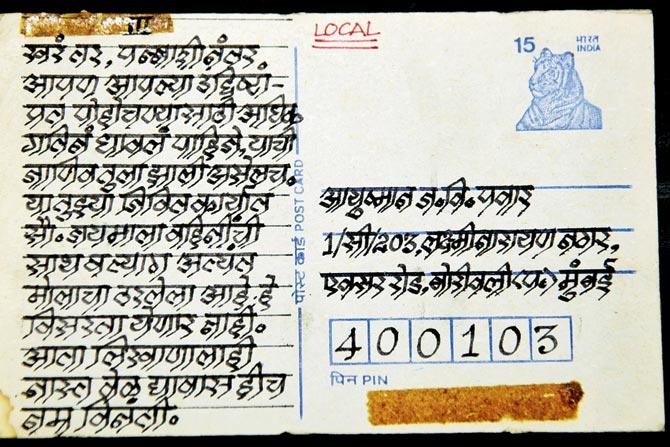Litterateur JV Pawar on the rise and fall of the Dalit Panthers movement, and his five-decade-long friendship with activist Raja Dhale

Former banker, JV Pawar, scouring through a bookshelf at his Borivali home. Pics/ Sameer Markande
Since Raja Dhale's demise last Tuesday, JV Pawar has been ceaselessly writing tributes, marking their five-decade-long friendship and activism. "None of my articles, however, begins with Dhale or his work. They have a mention of social reformer Dr Babasaheb Ambedkar in the first few lines itself, and how he left a lasting impact on the two of us. And Dhale would definitely appreciate me doing this," explains Pawar, who believes he and Dhale have always been loyal followers of Ambedkar's Buddhist movement. "I follow this norm in every column I write for newspapers and magazines. The subject may be someone else, but Ambedkar's ideologies need to reach everyone through my writing. And thus, bringing his name up right in the beginning is significant," the 76-year-old writer and poet clarifies, as he begins to tell us about his and Dhale's relentless struggle to achieve equal rights for Dalits in Maharashtra.
ADVERTISEMENT
Pawar was born in Pilavali, a remote village in Ratnagiri's Chiplun district. His date of birth, however, was never recorded by his uneducated parents. "But my birthdate was needed to enrol me in school. All my mother could recollect was that I was born on a rainy day. So, my schoolteacher estimated the date to be July 15, 1944." Pawar moved to Mumbai to pursue Class V education. Hailing from an impoverished family, he always knew he had to study harder than the rest to secure a better future. What he didn't know was that a 'counter' revolution, helmed by Ambedkar, was unfolding in the country.


Letters sent by Dhale to Pawar during the heyday of the Dalit Panthers movement
Finally on December 6, 1956, life took a different turn. "A nationwide bandh was called, and schools began to send all students home. I was happy that I got a half-day. But, my uncles and cousins had gathered, hoping I would read the evening newspaper to them." After reading out loud for a few minutes, the young Pawar looked up, only to find a sea of mourners in his small flat at Dhobi Talao. "Dr Ambedkar had passed away. A naive me was wondering why was everyone grieving his death. Who was he, I asked myself. And when I finally found out about him and his work towards ending discrimination against Dalits, I was stunned. That day, I mourned, too."
So began Pawar's journey to fighting injustice meted down by the ruling classes. "Poet Namdeo Dhasal and I wrote many articles together. But we knew we had to do something bigger to bring about a change." Around 1971, the Elayaperumal Committee was set up by the then Prime Minister Indira Gandhi. As part of this, Dalit leader L Elayaperumal was asked to prepare a report on Dalit atrocities from across the country. "When the report got published in the newspapers, Dhasal and I were appalled. The figures were disturbing, the nature of atrocities gave us sleepless nights." Meanwhile, another ghastly incident sent shockwaves across the country. "Two Dalit women were paraded naked in a Maharashtra village. This was when Dhale, who shared the bench with me while studying Marathi literature in a Mumbai college, and a few social reformers decided to go to that village and take the accused to task. They also wanted to publicly offer sarees to these women." But, Pawar refused to go. "I saw no point in humiliating the women all over again, by revealing their identities to journalists. Dhale and I had our share of differences. He was the more firebrand leader, but I was the calm orator."

Pawar and Dhale (both standing) with Dr Ambedkar's wife
So, without including Dhale in his mission, on May 29, 1972, Pawar and Dhasal started the Dalit Panthers, a social organisation to combat caste discrimination. It was largely inspired by the Black Panther Party, a socialist movement that sought to combat racial discrimination against African-Americans, during the Civil Rights Movement in the United States. "That same year, India was celebrating its 25th Independence Day. The dynamic Dhale wrote an article, Black Independence Day. The article pointed out that a court in the state had fined an accused R50 for forcing a Dalit woman to walk naked in public. Around the same time, in another judgment, the court imposed a fine of R350 for insulting the national flag. Dhale asked how in a country like ours an insult to the national flag was far more serious than an insult to a helpless woman. His words got statewide recognition." A few months later, he invited Dhale to address the Dalit Panthers' first public meeting. There, Dhale's speech again drew massive admiration. "He was already being considered a Panther, so I put forth the proposal, and he readily agreed to join our movement. Because of Dhale, the Panthers could prosper."
In 1974, the Panthers boycotted a by-election for the Maharashtra Legislative Assembly. "While Dalits were in minority in the rural areas, they were in a thumping majority in Mumbai. Eventually, as we wished, Roza Deshpande of the Communist Party of India won the elections." The Panthers emerged to fill the vacuum created in Dalit politics. But, the movement's heyday lasted only till 1977. "Dhasal had a Marxist approach, but Dhale and I followed Buddhist ideologies. So, we dissolved the association."
Pawar and Dhale, however, always kept in touch, right till the latter's demise. "I had been arguing with Dhale for the past two weeks. He told me he had written articles on Panthers and Ambedkar, but never published them. I was convincing him to get them printed, but in vain. I wish he had listened to me." When asked if he could think of anyone who would be able to take forth their legacy, Pawar says, "I cannot think of anyone who could replace us, as many end up compromising on their idealism in quest for power in politics. But, the movement for a new radicalism is waiting to be born. The time is ripe. There will be another Dhale and Pawar."
Catch up on all the latest Mumbai news, crime news, current affairs, and also a complete guide on Mumbai from food to things to do and events across the city here. Also download the new mid-day Android and iOS apps to get latest updates
 Subscribe today by clicking the link and stay updated with the latest news!" Click here!
Subscribe today by clicking the link and stay updated with the latest news!" Click here!






